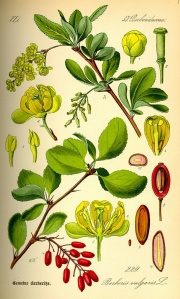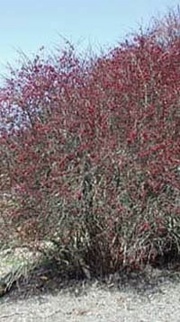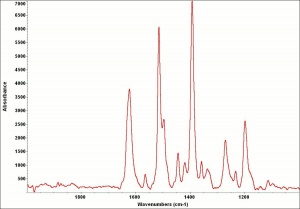Difference between revisions of "Berberis dye"
| Line 4: | Line 4: | ||
A yellow dye primarily obtained from the stems and roots of the [[barberry]] (''Berberis vulgaris'') bush. Berberis contains the colorants berberine (berberine bisulfate, [[berberine sulfate]], berberine hydrochloride), berbamine, and oxyacanthine along with some soluble tannins. The yellow color is substantive on [[wool]], [[leather]], and [[silk]]. It has also been used as a yellow lake pigment for coloring prints (Harley 1982). Other sources of berberines include goldenseal (''Hydrastis canadensis'') plants and bark from the amur cork tree (''Phellodendron amurense''). | A yellow dye primarily obtained from the stems and roots of the [[barberry]] (''Berberis vulgaris'') bush. Berberis contains the colorants berberine (berberine bisulfate, [[berberine sulfate]], berberine hydrochloride), berbamine, and oxyacanthine along with some soluble tannins. The yellow color is substantive on [[wool]], [[leather]], and [[silk]]. It has also been used as a yellow lake pigment for coloring prints (Harley 1982). Other sources of berberines include goldenseal (''Hydrastis canadensis'') plants and bark from the amur cork tree (''Phellodendron amurense''). | ||
| − | [[File:bthunbergiiv1.jpg|thumb|Japanese barberry | + | [[File:bthunbergiiv1.jpg|thumb|Japanese barberry''Berberis thunbergii'']] |
| − | + | For analysis examples, see: | |
| + | * http://cameo.mfa.org/wiki/Berberis_dye_(berberis_Julianae)_LC | ||
| + | * http://cameo.mfa.org/wiki/Berberis_dye_(berberis_thunbergii)_LC | ||
| + | * http://cameo.mfa.org/wiki/Berberis_dye_(berberis_tibetasia)_LC | ||
| + | * http://cameo.mfa.org/wiki/PMA_2004-7,_Tibetan_Buddhist_altar_(19th_to_20th_century) | ||
== Synonyms and Related Terms == | == Synonyms and Related Terms == | ||
Revision as of 13:30, 19 August 2020
Description
A yellow dye primarily obtained from the stems and roots of the Barberry (Berberis vulgaris) bush. Berberis contains the colorants berberine (berberine bisulfate, Berberine sulfate, berberine hydrochloride), berbamine, and oxyacanthine along with some soluble tannins. The yellow color is substantive on Wool, Leather, and Silk. It has also been used as a yellow lake pigment for coloring prints (Harley 1982). Other sources of berberines include goldenseal (Hydrastis canadensis) plants and bark from the amur cork tree (Phellodendron amurense).
For analysis examples, see:
- http://cameo.mfa.org/wiki/Berberis_dye_(berberis_Julianae)_LC
- http://cameo.mfa.org/wiki/Berberis_dye_(berberis_thunbergii)_LC
- http://cameo.mfa.org/wiki/Berberis_dye_(berberis_tibetasia)_LC
- http://cameo.mfa.org/wiki/PMA_2004-7,_Tibetan_Buddhist_altar_(19th_to_20th_century)
Synonyms and Related Terms
Berberis vulgaris (common barberry); Hydrastis canadensis (goldenseal); Phellodendron amurense (amur cork tree); agracejo (Esp.); crespino (It.); berberines; berberis bush
Hazards and Safety
Toxic by ingestion, inhalation and skin absorption.
Color has poor lightfastness.
Resources and Citations
- Richard S. Lewis, Hawley's Condensed Chemical Dictionary, Van Nostrand Reinhold, New York, 10th ed., 1993
- R.D. Harley, Artists' Pigments c. 1600-1835, Butterworth Scientific, London, 1982
- Random House, Webster's Encyclopedic Unabridged Dictionary of the English Language, Grammercy Book, New York, 1997
- The Merck Index, Martha Windholz (ed.), Merck Research Labs, Rahway NJ, 10th edition, 1983 Comment: entry 1192
- Wikipedia: http://en.wikipedia.org/wiki/Berberis (accessed Sept. 2 3005)


